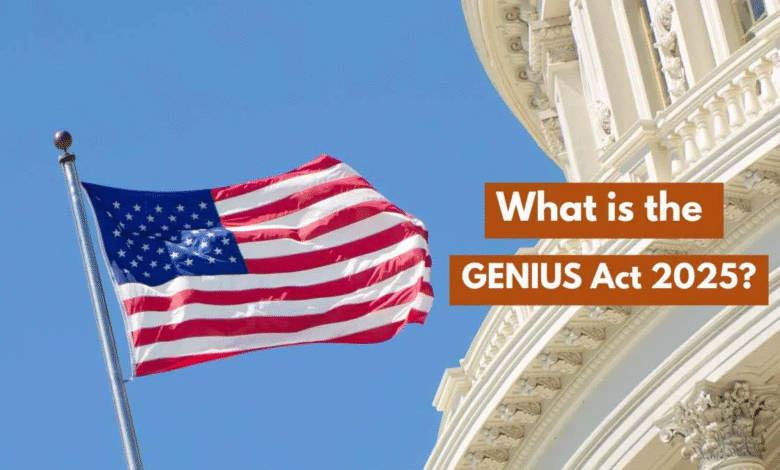GENIUS Act: A Milestone in Stablecoin Regulation

The GENIUS Act, signed into law by President Donald Trump on July 18, 2025, represents a pivotal moment in US cryptocurrency law, specifically regarding stablecoin regulation. Officially titled the Guiding and Establishing National Innovation for US Stablecoins Act, this groundbreaking legislation provides a detailed framework for the oversight of stablecoins, which are digital tokens tied to traditional assets like the U.S. dollar. With strong bipartisan support, the GENIUS Act lays down critical licensing standards, reserve mandates, and oversight protocols for issuers while outlawing interest-bearing stablecoins. Additionally, it introduces ethical guidelines for government officials involved in the crypto industry, aiming to foster innovation without compromising consumer protections. As this law is set to take effect in early 2027, the White House views the GENIUS Act as essential to maintaining America’s leadership in the evolving landscape of finance and digital token oversight.
The recent implementation of the GENIUS Act signifies a transformative shift in American financial regulations concerning digital currencies, particularly those tampered with like stablecoins. Known formally as the Guiding and Establishing National Innovation for US Stablecoins Act, this ambitious piece of legislation is set to establish a robust framework for managing stable digital assets. The act not only sets forth licensing and reserve requirements for issuers but also promotes ethical standards for government officials, ensuring integrity within the rapidly advancing cryptocurrency sector. Democrats have expressed concerns over certain regulatory aspects, yet the act is celebrated for its potential to drive innovation and secure consumer interests. As we look towards the future of financial practices, the GENIUS Act attempts to position the U.S. at the forefront of cryptocurrency evolution, reinforcing its global economic influence.
Understanding the GENIUS Act and Its Impact on Stablecoin Regulation
The GENIUS Act, officially known as the Guiding and Establishing National Innovation for US Stablecoins Act, represents a pivotal moment in the landscape of cryptocurrency regulation in the United States. Signed into law by President Donald Trump on July 18, 2025, it serves as the first federal legislation specifically tailored to address the intricate dynamics of stablecoins—digital tokens distinguished by their peg to traditional assets like the U.S. dollar. This act aims to establish a robust regulatory framework that emphasizes consumer protection, encouraging innovation within the crypto industry while ensuring a strict oversight mechanism is in place.
One of the core components of the GENIUS Act is its establishment of licensing standards for stablecoin issuers, which provides a clear set of guidelines for compliance. Additionally, reserve requirements are delineated, ensuring that every issued stablecoin is backed adequately by the corresponding assets, thereby enhancing stability and consumer trust. The act also takes a stance against interest-bearing stablecoins, which could potentially complicate the landscape of digital token oversight. As the legislation unfolds, it will be interesting to observe how these regulations affect crypto industry innovation and the overall market for stablecoins.
The Role of bipartisan Support in Advancing US Cryptocurrency Law
The passage of the GENIUS Act through Congress was marked by significant bipartisan support, highlighting a rare moment in a politically divided landscape. Both Republican and Democratic leaders recognized the necessity for effective and coherent US cryptocurrency law, which has long lagged behind the rapid advancements in the digital asset space. By coming together, lawmakers aimed to create a regulatory structure that not only promotes innovation within the crypto sector but also affords essential protections for consumers engaging with stablecoins.
This cooperation across party lines illustrates a growing consensus on the importance of establishing a well-defined framework for cryptocurrency regulation. Despite concerns from some legislators regarding potential shortcomings in regulatory measures, the collaborative spirit behind the GENIUS Act suggests a commitment to evolving legislation that balances innovation within the crypto industry with necessary oversight. This precedent could lead to further advancements in digital token oversight as lawmakers continue to refine and adapt regulations to meet the needs of a fast-changing market.
Bipartisan Challenges in Implementing the GENIUS Act
While the GENIUS Act marks a significant step in shaping stablecoin regulation in the United States, it is not without its challenges. Bipartisan support for the legislation did not eclipse the critiques from within the Democratic party, with many members expressing concerns about the holistic effectiveness of the regulatory framework. Criticisms focus on potential loopholes and the need for more stringent regulations on blockchain-based technologies that might undermine consumer safety. Therefore, the implementation process will require careful consideration to navigate these complex dynamics.
Moreover, the forthcoming regulations to be issued by the Treasury and Federal Reserve will play a crucial role in determining the law’s overall impact. Some lawmakers worry that if the regulatory details are not thoroughly vetted, the act may inadvertently hinder growth and innovation within the cryptocurrency sector, which is vital for the U.S. economy. Therefore, as stakeholders await these protective measures, it is essential to maintain open channels of communication to address emerging issues and adapt strategies as necessary.
The Future of Stablecoins in Light of the GENIUS Act
With the enactment of the GENIUS Act, the future of stablecoins in the United States appears promising yet complex. The regulatory framework established by the act lays a foundation for the safe and robust development of digital tokens while imposing necessary guardrails to protect consumers. This foresight may not only stabilize the current state of the crypto market but could also lay claim to American financial leadership in the global crypto space. As the framework guides the evolution of stablecoins, it will undoubtedly draw interest from both traditional financial institutions and emerging crypto entities alike.
However, the effectiveness of the GENIUS Act in fostering innovation remains to be tested. A critical factor will be how the act’s reserve requirements and licensing standards impact the ability of new competitors to enter the stablecoin space. It is crucial for future market entrants to adapt quickly to the established rules while pushing for advancements that could redefine how digital assets operate. As the deadline for implementation approaches in 2027, stakeholders must remain engaged in discussions around the act’s stipulations, ensuring the growth of the crypto industry is adequately supported.
Analysis of Trump’s Influence on Crypto Industry Innovation
President Trump’s endorsement of the GENIUS Act reflects his broader agenda to position the United States as a leader in technological innovation, particularly within the crypto industry. His administration’s focus on reducing regulatory burdens aligns with the ethos of many blockchain advocates who emphasize the transformative potential of cryptocurrencies and stablecoins. By signing this legislation into law, Trump aims to send a clear message to the market: the U.S. is committed to embracing the potential of blockchain technologies and establishing a reliable environment for investment.
Yet, Trump’s personal investments in the cryptocurrency space have raised eyebrows and led to skepticism about the motivations behind the GENIUS Act. Critics argue that while the act aims to enhance consumer protections, there remains an underlying concern about conflicts of interest and the potential for regulatory capture. Nevertheless, Trump’s proactive stance may, ironically, benefit the industry by driving bipartisan efforts to solidify a regulatory framework that accommodates innovation without unnecessary hindrances. This tension will likely influence the political discourse surrounding future regulations in the crypto landscape.
The Importance of Consumer Protection in Stablecoin Legislation
As the first major federal legislation aimed at regulating stablecoins, the GENIUS Act places a strong emphasis on consumer protection. This aspect is crucial, given the volatility often associated with cryptocurrencies and the challenges that consumers face when engaging with digital tokens. The act mandates that issuers adhere to a strict set of guidelines, including reserve requirements, which help ensure stability and mitigate risks for everyday users. These measures aim to foster greater trust in stablecoins, bolstering their appeal as an alternative financial instrument.
Consumer protection mechanisms are vital for the long-term adoption of stablecoins. The GENIUS Act’s prohibition of interest-bearing stablecoins may also reflect a desire to prevent complications that could arise in terms of consumer expectations and product offerings. As consumers become more educated regarding digital currencies, regulations that prioritize their safety and provide clarity in the offerings will further solidify the market infrastructure. Ensuring that consumers can navigate this changing landscape with confidence will be critical as the regulatory framework continues to evolve.
The Role of the Treasury in Regulating Digital Tokens
The implementation of the GENIUS Act is set to involve the Treasury Department significantly, as it will be responsible for drafting the final regulations that govern stablecoin issuers. These regulations will determine how effectively the act meets its goals, balancing innovation and consumer protection. The Treasury’s role will be pivotal in interpreting the law’s guidelines to ensure that the emerging stablecoin market aligns with broader economic policies and standards. In doing so, they will need to remain vigilant regarding potential market disruptions that could arise from unforeseen circumstances.
Moreover, the involvement of the Treasury could open the door for more comprehensive regulatory frameworks that not only address stablecoins but also encompass other digital assets. The department’s insights will help shape a coherent approach to digital token oversight, reinforcing the U.S.’s position in the global financial landscape. As the Treasury collaborates with industry stakeholders, the outcome will reflect the balance between fostering innovation while ensuring the safety and security of the financial system.
Impact of the GENIUS Act on US Financial Dominance
The GENIUS Act’s implementation signifies a strategic maneuver by the United States to bolster its financial dominance through innovation in the cryptocurrency landscape. By establishing clear regulations for stablecoins, the act not only seeks to protect consumers but also positions the U.S. as a leading force in digital finance. As other countries continue to grapple with regulatory frameworks, the clarity provided by the GENIUS Act could enhance the attractiveness of U.S.-based crypto ventures, thereby cementing American dominance in the evolving global landscape.
Moreover, fostering a stable regulatory environment for stablecoins could encourage investment and development within the cryptocurrency market, enabling businesses to thrive under predictable regulations. The implications of this growth extend beyond the borders of the U.S., influencing countries globally as they seek to replicate successful regulatory models. By championing the advancement of stablecoins, the United States may not only reinforce its own economic stature but also drive international financial systems towards innovation and adaptation.
Future Developments in Cryptocurrency Legislation
As the GENIUS Act sets the stage for stablecoin regulation, the future of cryptocurrency legislation in the U.S. is likely to unfold in response to both market developments and technological advancements. The upcoming regulations from the Treasury will be instrumental in shaping this trajectory, as they will address not only stablecoins but potentially affect broader areas of cryptocurrency and blockchain technology. Stakeholders must remain engaged in the legislative process to ensure that the law evolves in a manner that encourages responsible innovation.
Additionally, the response from the crypto community will be crucial in shaping future discussions around legislation. Ongoing dialogue between lawmakers, industry representatives, and consumer advocacy groups can foster a collaborative environment that encourages the formation of policies that benefit all parties. As digital token oversight becomes more prevalent, the divergent interests within this sector highlight the need for regulations that embrace the unique nature of cryptocurrencies while ensuring that trust and safety remain paramount.
Frequently Asked Questions
What is the GENIUS Act and its significance for stablecoin regulation in the US?
The GENIUS Act, officially known as the Guiding and Establishing National Innovation for US Stablecoins Act, is a groundbreaking legislation signed by President Trump on July 18, 2025. It establishes the first federal framework for stablecoin regulation in the United States, setting standards for licensing, reserve requirements, and oversight for digital token issuers. This act is seen as a significant step forward for the US cryptocurrency law, aiming to foster innovation in the crypto industry while ensuring consumer protections.
How does the GENIUS Act impact the cryptocurrency industry innovation?
The GENIUS Act is designed to promote cryptocurrency industry innovation by creating a clear regulatory environment for stablecoins, which are digital tokens tied to traditional assets like the dollar. By setting comprehensive standards and guidelines, the legislation encourages the development of new financial technologies while safeguarding consumer interests, effectively positioning the US as a leader in the global crypto landscape.
What are the key provisions of the GENIUS Act related to digital token oversight?
Key provisions of the GENIUS Act include establishing licensing standards for stablecoin issuers, enforcing reserve requirements to back these digital tokens, and implementing ethical guidelines for government officials involved in cryptocurrency regulation. This oversight mechanism aims to provide a cohesive framework that enables safe and transparent operations within the stablecoin market.
What potential criticisms have been raised about the GENIUS Act and Trump legislation?
Some criticisms of the GENIUS Act focus on perceived regulatory shortcomings, especially from Democrats who argue that the act may not adequately address the complex challenges of the cryptocurrency landscape. Additionally, concerns have been voiced regarding President Trump’s personal investments in cryptocurrency, which critics believe could influence the legislation’s objectives.
When will the GENIUS Act take effect and what are the next steps for implementation?
The GENIUS Act is set to take effect by early 2027, pending final regulations from the Treasury and Federal Reserve. The implementation will involve developing comprehensive guidelines to support the stablecoin regulation framework established by the act, ensuring that the oversight mechanisms are effectively integrated into the existing financial system.
What measures does the GENIUS Act include to protect consumers in the cryptocurrency market?
The GENIUS Act incorporates various measures to protect consumers, including establishing reserve requirements for stablecoin issuers to ensure the tokens are backed by adequate assets. It also prohibits interest-bearing stablecoins, which can pose risks to investors. These measures aim to enhance transparency and maintain consumer trust in the rapidly evolving market of digital tokens.
How does the GENIUS Act relate to the broader context of US cryptocurrency law?
The GENIUS Act represents a pivotal development within the broader framework of US cryptocurrency law, being the first significant federal legislation aimed at regulating stablecoins specifically. By addressing licensing and oversight, it complements other legal efforts to create a more comprehensive regulatory environment for various cryptocurrency assets, thus shaping the future landscape of digital finance in the United States.
| Key Point | Description |
|---|---|
| Signing Date | July 18, 2025 |
| Official Name | Guiding and Establishing National Innovation for US Stablecoins Act |
| Legislation Type | Federal legislation regulating stablecoins |
| Key Features | Establishes a framework for issuing and overseeing stablecoins, licensing standards, reserve requirements, prohibits interest-bearing stablecoins, ethical guidelines for officials |
| Bipartisan Support | Passed with support from both parties in Congress |
| Industry Impact | Considered a significant advancement for the cryptocurrency industry, aiming to boost innovation while protecting consumers |
| Next Steps | Final regulations to be issued by the Treasury and Federal Reserve, law effective by early 2027 |
| Remarks by President Trump |
Summary
The GENIUS Act represents a transformative step in the regulation of stablecoins within the United States. Signed into law by President Donald Trump on July 18, 2025, this landmark legislation establishes a clear framework to oversee stablecoins, making it the first significant federal law addressing this rapidly evolving digital currency market. By setting explicit licensing, reserve, and ethical requirements for stablecoin issuers, the GENIUS Act aims not only to foster innovation but also to ensure consumer protection in an environment fraught with potential risks. With bipartisan support and intended regulations set to roll out by early 2027, this legislation aims to secure the U.S.’s position as a leader in global finance and cryptocurrency technology.




